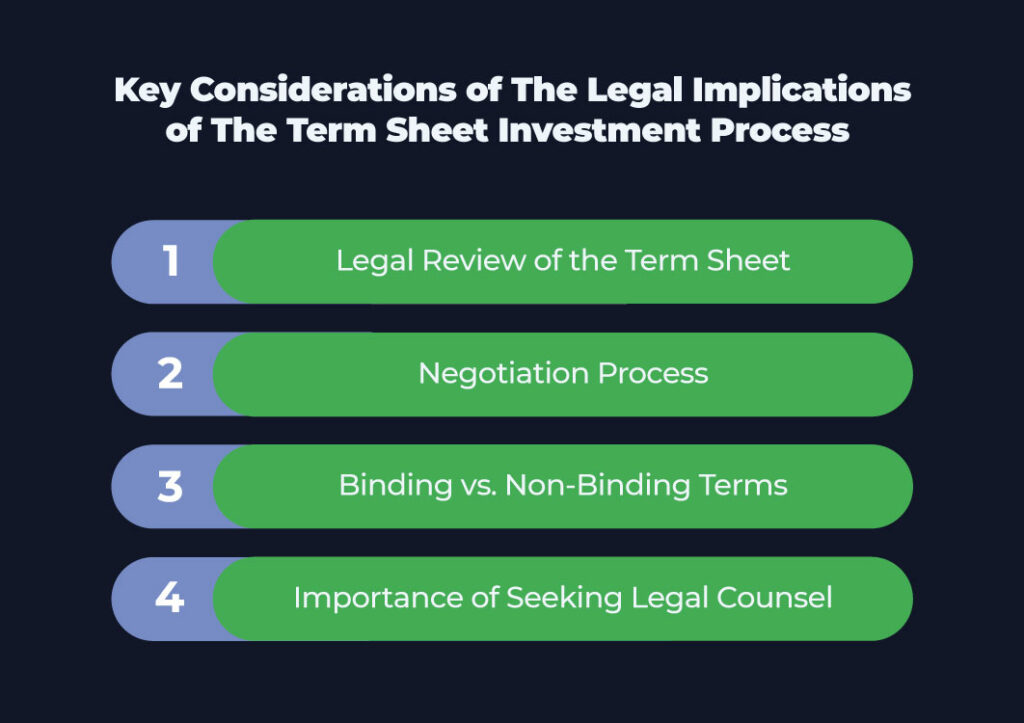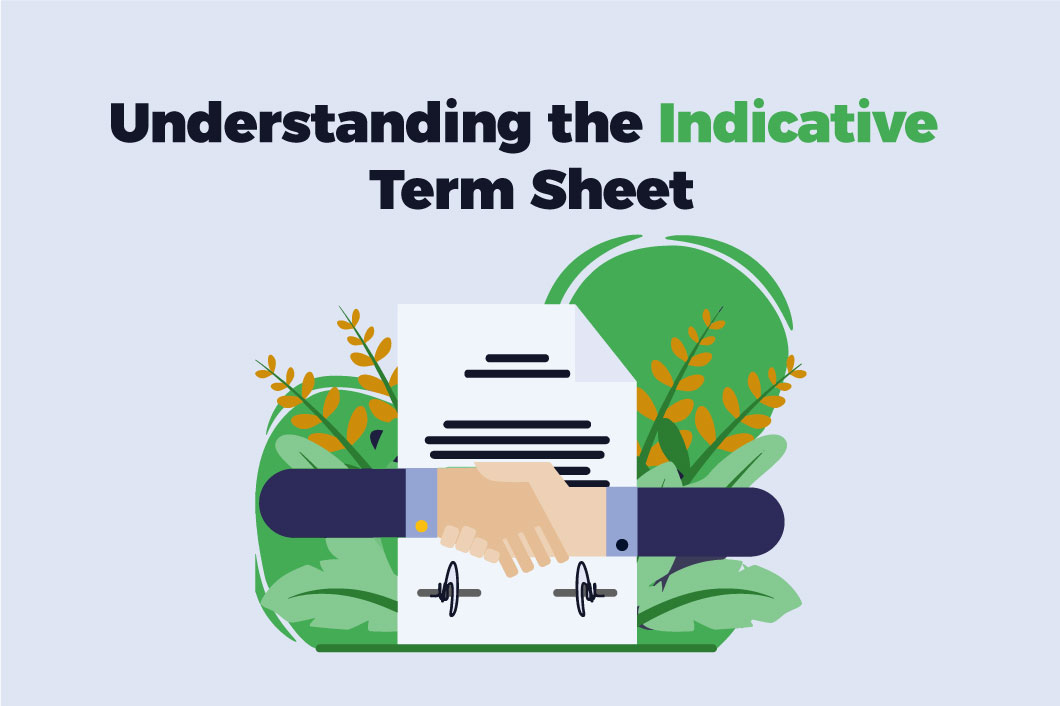Be the First to Navigating the Term Sheet Investment Process
Before delving into the intricacies of the term sheet investment process, let’s define what a term sheet is and emphasize its significance. A term sheet is a non-binding document that outlines the key terms and conditions of an investment deal between the entrepreneur and the investor. It serves as a roadmap for negotiations and lays the foundation for the final agreement, which is legally binding. Understanding the term sheet is crucial because it sets the framework for the investment and can significantly impact the entrepreneur’s future.
Ready to Propel Your Business to New Heights? Contact Easy Capraise Today!
Key Elements of a Term Sheet

A comprehensive term sheet covers several essential elements that both parties should carefully consider and negotiate. Let’s explore some of the key elements typically found in a term sheet:
Parties Involved
The term sheet should clearly identify the parties involved in the investment, including the entrepreneur, the investor(s), and any other stakeholders. This section may also include information about the company’s structure, such as whether it’s a corporation or a limited liability company (LLC).
Investment Amount and Valuation
The term sheet specifies the amount of investment the entrepreneur seeks and how the valuation of the company is determined. Valuation methods can vary, but common approaches include pre-money valuation and post-money valuation. This section should outline the financial terms and expectations regarding the investment.
Capitalization Table
The capitalization table, also known as a cap table, provides an overview of the company’s ownership structure and details the distribution of equity among shareholders. It outlines the ownership percentages of existing shareholders and the proposed ownership percentages after the investment.
Liquidation Preferences
Liquidation preferences determine the order in which the proceeds from a liquidity event, such as a sale or merger of the company, are distributed. This section of the term sheet specifies whether the investor has a preferred position in the distribution of proceeds and outlines the terms of such preferences.
Board Composition
The term sheet may outline the composition of the company’s board of directors. It may specify the number of board seats allocated to the investor(s) and any requirements for board representation, such as certain qualifications or expertise.
Anti-Dilution
Anti-dilution provisions are an important aspect of term sheets, and they aim to protect the investor’s ownership stake in the event of future equity issuances at a lower valuation. While anti-dilution provisions can offer benefits to investors, they also have potential drawbacks that entrepreneurs should consider. Let’s explore the pros and cons of anti-dilution provisions:
Pros of Anti-Dilution Provisions:
Protecting Investor’s Ownership: Anti-dilution provisions ensure that investors’ ownership percentage remains intact even if the company raises additional funding at a lower valuation. This protection can be attractive to investors, as it safeguards their financial interests and maintains their influence over the company’s decision-making.
Maintaining Investor Confidence: By incorporating anti-dilution provisions in the term sheet, entrepreneurs demonstrate their commitment to protecting investors’ interests. This can foster trust and confidence in the entrepreneur’s ability to navigate future funding rounds while ensuring fair treatment for all shareholders.
Mitigating Downside Risk: Anti-dilution provisions provide a safety net for investors in the event of adverse market conditions or unforeseen challenges. It reduces the risk of significant dilution of their ownership stake, which could impact their ability to realize a return on their investment.
Cons of Anti-Dilution Provisions:
Negative Impact on Founders and Early Employees: Anti-dilution provisions can result in dilution for founders and early employees who hold common shares. In some cases, this dilution can be significant, impacting their ownership and control over the company. This may discourage entrepreneurship and hinder the ability to attract and retain top talent.
Complexity and Negotiation Challenges: Anti-dilution provisions can be complex to implement, requiring detailed calculations and adjustments to the investor’s share price or conversion terms. Negotiating the specific terms of anti-dilution provisions can also be challenging, potentially leading to prolonged discussions and delays in closing the investment deal.
Restrictions on Future Financing: Anti-dilution provisions may deter potential future investors who may be hesitant to participate in subsequent funding rounds due to concerns about the impact on their ownership and control. This can limit the company’s ability to secure additional capital and restrict its growth potential.
Entrepreneurs should carefully consider the pros and cons of anti-dilution provisions and their potential impact on the company’s ownership structure and future fundraising efforts. Consulting with legal and financial professionals can help entrepreneurs navigate the complexities and negotiate terms that strike a fair balance between investor protection and founder-friendly terms.
Voting Rights
The term sheet may address voting rights, including major decisions that require shareholder approval. It outlines the voting power of each shareholder, including the investor, and any special voting rights granted to certain classes of shares.
Exit Strategy
An exit strategy defines how and when investors can realize a return on their investment. Common exit strategies include initial public offerings (IPOs) and acquisitions. This section of the term sheet provides an overview of the proposed exit strategy and any associated rights or obligations.
First Refusal in Term Sheet
A First Refusal provision, also known as a Right of First Refusal (ROFR), is a common term found in term sheets. It grants existing shareholders, typically the company or other investors, the right to purchase shares from a shareholder who wishes to sell their equity stake. Here are the key aspects and considerations related to First Refusal provisions:
Protecting Existing Shareholders:
First Refusal provisions aim to protect the ownership structure and prevent dilution by giving existing shareholders the opportunity to maintain their proportional ownership when a shareholder wants to sell their shares. This can help preserve the company’s capital structure and prevent unwanted changes in control.
Exercising the Right:
When a shareholder intends to sell their shares, they must first offer them to the existing shareholders before seeking external buyers. If the existing shareholders decline to purchase the shares within a specified time frame, the selling shareholder is then free to sell them to an external party.
Price Determination:
Refusal provisions typically specify how the purchase price will be determined. This can be a pre-negotiated price, the fair market value determined by an independent valuation expert, or a price determined through a formula outlined in the term sheet. Clear guidelines for pricing are important to ensure fairness and minimize potential conflicts.
Exceptions and Limitations:
Also, its provisions often include exceptions and limitations. For example, they may exclude certain transfers, such as transfers to family members or affiliates. Additionally, there may be limitations on the maximum number of shares that existing shareholders are obligated to purchase, ensuring they have the flexibility and don’t face undue financial burdens.
Understanding the Legal Implications
As an entrepreneur, it’s crucial to recognize the legal implications of the term sheet investment process. Here are some key considerations:
Legal Review of the Term Sheet
Although term sheets are generally non-binding, it’s essential to have the document reviewed by legal counsel. Lawyers specializing in venture capital and startup investments can help identify potential risks, ensure the terms align with the entrepreneur’s goals, and protect the entrepreneur’s interests throughout the negotiation process.
Negotiation Process
Negotiating the term sheet requires a thorough understanding of the terms and implications. Entrepreneurs should be prepared to negotiate favorable terms while maintaining a constructive relationship with the investor. Proper negotiation can help align the interests of both parties and set the stage for a successful partnership.
Binding vs. Non-Binding Terms
While most term sheets are non-binding, some provisions, such as exclusivity agreements or confidentiality clauses, may be binding. It’s crucial to differentiate between binding and non-binding terms to understand the legal obligations associated with each.
Importance of Seeking Legal Counsel
Entrepreneurs should consult legal professionals experienced in venture capital and startup investments. Seeking legal advice can help entrepreneurs navigate the complexities of the term sheet and ensure their rights are protected throughout the investment process.
Term Sheet vs. Final Agreement
Recognizing the relationship between the term sheet and the final agreement is essential. The term sheet serves as a foundation for the final agreement, which will include more detailed and legally binding provisions. Here are some key considerations:
Relationship between the Term Sheet and the Final Agreement
The final agreement builds upon the terms outlined in the term sheet. It expands on these terms, providing greater detail and addressing additional legal and business considerations. The term sheet should be seen as a starting point for negotiations rather than a comprehensive agreement.
Ensuring Consistency between the Two Documents
To avoid confusion and potential disputes, it’s crucial to ensure consistency between the term sheet and the final agreement. Any discrepancies or omissions should be resolved during the negotiation process to create a seamless transition from the term sheet to the final agreement.
Importance of thorough Due Diligence
Entrepreneurs should conduct thorough due diligence on potential investors before signing the term sheet. This includes evaluating their track record, reputation, and alignment with the entrepreneur’s vision. Due diligence helps mitigate risks and ensures compatibility between the investor and the entrepreneur.
Best Practices for Navigating the Term Sheet Investment Process
Navigating the term sheet investment process can be challenging, but following best practices can help entrepreneurs achieve favorable outcomes. Here are some recommendations to consider:
Conducting Research on Potential Investors
Before entering into discussions with potential investors, entrepreneurs should conduct thorough research. This includes understanding the investor’s portfolio, investment criteria, and reputation within the industry. A well-matched investor can bring not only financial support but also strategic value and industry expertise.
Preparing a Comprehensive Business Plan
Having a well-developed business plan is crucial for attracting investors and negotiating favorable terms. The business plan should outline the company’s vision, market opportunity, competitive advantage, financial projections, and growth strategy. A comprehensive and compelling business plan demonstrates the entrepreneur’s professionalism and commitment.
Understanding Negotiation Tactics
Negotiating the term sheet requires a solid understanding of negotiation tactics. Entrepreneurs should be prepared to advocate for their interests while maintaining a collaborative approach. It’s important to strike a balance between assertiveness and flexibility to foster a mutually beneficial agreement.
Seeking Advice from Experienced Entrepreneurs
Entrepreneurs who have successfully navigated the term sheet investment process can provide valuable insights and advice. Seeking guidance from experienced entrepreneurs can help newcomers avoid common pitfalls and gain a deeper understanding of the process.
Common Pitfalls to Avoid
Navigating the term sheet investment process can be complex, and entrepreneurs should be mindful of common pitfalls that could negatively impact their investment deal. By being aware of these pitfalls and taking proactive measures to avoid them, entrepreneurs can increase their chances of securing favorable terms and successful partnerships. Let’s explore some of these pitfalls in detail:
Lack of Understanding of Terms and Implications
One common pitfall is a lack of thorough understanding of the terms and their implications outlined in the term sheet. Entrepreneurs may rush into signing the term sheet without fully comprehending the long-term consequences. For example, they might overlook the impact of anti-dilution provisions or liquidation preferences on their ownership stake and potential future funding rounds. It is crucial to seek professional advice and conduct a comprehensive analysis of each term before committing to the agreement.
Failure to Conduct Due Diligence on Potential Investors
Entrepreneurs often make the mistake of neglecting due diligence on potential investors. Failing to investigate the investor’s track record, reputation, and alignment with the entrepreneur’s vision can lead to partnering with incompatible or unreliable investors. It is important to thoroughly vet potential investors by reviewing their investment portfolio, speaking with their portfolio companies, and assessing their ability to add strategic value beyond financial support. Entrepreneurs should also consider engaging legal counsel to conduct legal due diligence, ensuring the investor’s compliance with regulatory requirements.
Overlooking Legal Review and Counsel
Another pitfall is underestimating the importance of legal review and counsel throughout the term sheet negotiation process. Entrepreneurs may be tempted to minimize costs and skip involving legal professionals, thinking they can handle the negotiations themselves. However, this approach can result in overlooking crucial legal considerations and potential risks. Legal counsel specializing in venture capital and startup investments can provide valuable guidance, identify potential red flags, and help negotiate more favorable terms.
Inadequate Evaluation of Board Composition
The composition of the board of directors is a critical aspect of the term sheet, and entrepreneurs should carefully consider the minimum number of seats required for making final decisions. In some cases, entrepreneurs may inadvertently relinquish decision-making power by agreeing to a board composition that grants excessive control to the investor. It is important to strike a balance and ensure the entrepreneur retains sufficient influence and decision-making authority over key matters.
Lack of a Comprehensive Data Room
A data room is a secure online repository that contains all the relevant information about the company that potential investors may need for due diligence. Failing to establish a comprehensive data room can hinder the due diligence process and create unnecessary delays. Investors rely on accurate and easily accessible information to assess the company’s value and risks associated with the investment. Entrepreneurs should proactively organize and present their company’s financial, legal, and operational information in a structured and transparent manner.
Failure to Anticipate Changing Market Conditions and Trends
Entrepreneurs should be mindful of the ever-evolving landscape of investment terms and conditions. Market trends and investor preferences can shift over time, resulting in changes to the typical terms used in term sheets. For instance, recently, venture capitalists have been tending to use fewer terms, opting for more founder-friendly and simplified structures. Entrepreneurs must stay updated on the latest trends and industry standards to ensure they are negotiating within a competitive landscape.
It is crucial for entrepreneurs to recognize these common pitfalls and take proactive measures to mitigate them. Seeking expert advice, conducting comprehensive due diligence, and thoroughly understanding the terms and implications of the term sheet will significantly increase the chances of securing favorable investment terms and establishing a strong foundation for future growth and success. By avoiding these pitfalls, entrepreneurs can navigate the term sheet investment process more effectively and maximize the potential for a mutually beneficial partnership with investors.
KPIs in Term Sheet
Key Performance Indicators (KPIs) are important metrics used to measure the performance and progress of a company. Including KPI provisions in the term, sheet helps align the expectations between the investor and the entrepreneur regarding the company’s growth and milestones. Here’s why KPIs are valuable in a term sheet:
Clear Performance Expectations
KPIs provide a clear framework for measuring and assessing the company’s performance. They establish specific targets and milestones that the entrepreneur must achieve to demonstrate progress and success. Having defined KPIs helps align the investor and entrepreneur’s vision for the company and sets a common understanding of what constitutes success.
Accountability and Monitoring
KPIs serve as a tool for holding entrepreneurs accountable for delivering on their promises and commitments. They provide a basis for ongoing monitoring and evaluation of the company’s performance, enabling the investor to assess whether the investment is meeting its objectives and to identify potential areas of concern.
Investor Confidence and Value Creation
Well-defined KPIs instill confidence in the investor by demonstrating that the entrepreneur has a clear growth strategy and a roadmap for achieving milestones. The achievement of KPIs over time enhances the company’s valuation and attractiveness to potential future investors or acquirers.
Performance-Driven Decision-Making
KPIs provide valuable insights for making informed business decisions. By tracking and analyzing key metrics, entrepreneurs can identify strengths, weaknesses, and areas requiring improvement. This data-driven approach empowers the entrepreneur to make strategic decisions that drive growth and optimize performance.
When incorporating KPI provisions into the term sheet, it is essential to ensure that the KPIs are specific, measurable, achievable, relevant, and time-bound (SMART). The investor and the entrepreneur should collaborate to define KPIs aligning with the company’s business model, industry standards, and growth trajectory. Regular reporting and communication on KPI progress will help foster a transparent and collaborative relationship between the investor and the entrepreneur.
ESOP in Term Sheet
An Employee Stock Ownership Plan (ESOP) is a common component of term sheets, particularly in startups and growth-stage companies. An ESOP is a mechanism through which a company grants or sells its shares to employees, providing them with an ownership stake in the company. Including ESOP provisions in the term sheet can have several benefits:
Employee Incentivization
An ESOP serves as a powerful tool to incentivize and retain top talent. By granting employees ownership in the company, they become aligned with its success and have a vested interest in driving its growth and profitability. This can improve employee loyalty, motivation, and productivity.
Attracting Top Talent
Startups often face challenges in attracting experienced and skilled employees who may be enticed by the stability and benefits offered by established companies. An ESOP can make the startup more appealing by offering the potential for significant financial rewards if the company achieves success or experiences a liquidity event.
Retention and Reduced Turnover
ESOPs can play a crucial role in reducing employee turnover. Employees who have a financial stake in the company are more likely to stay committed and dedicated to the long-term goals and vision. This can result in lower recruitment and training costs associated with high employee turnover.
Tax Benefits
ESOPs can offer tax advantages for both the company and its employees. Contributions made to an ESOP are generally tax-deductible for the company, reducing its overall tax liability. Additionally, employees may enjoy favorable tax treatment when they exercise their stock options or sell their shares, depending on the jurisdiction and specific regulations.
It is important for entrepreneurs to carefully structure the ESOP provisions in the term sheet, considering factors such as the percentage of equity reserved for the ESOP, vesting schedules, and eligibility criteria for employee participation. Seeking guidance from legal and financial professionals experienced in ESOPs can help entrepreneurs design a program that aligns with their goals and maximizes the benefits for employees and the company.
FAQs
What is the purpose of a term sheet in the investment process?
A term sheet is a non-binding document that outlines the key terms and conditions of an investment deal between an entrepreneur and an investor. Its purpose is to serve as a basis for negotiation and discussion, establishing a framework for the investment agreement.
What information is typically included in a term sheet for investment?
A term sheet for investment usually includes details such as the investment amount, valuation of the company, ownership stake, rights and preferences of the investor, board composition, anti-dilution provisions, liquidation preferences, governance provisions, and key performance indicators (KPIs), among other important terms.
How does a term sheet benefit investors?
A term sheet provides investors with a clear understanding of the terms and conditions of the investment. It outlines the investor’s rights, protections, and expectations, including the potential return on investment. The term sheet also sets the stage for further due diligence and legal documentation.
What is the significance of a short-term and long-term investment balance sheet in a term sheet?
The short-term and long-term investment balance sheets provide a snapshot of the financial health and performance of the company. These balance sheets assist investors in assessing the company’s current and future financial stability, cash flow, and potential risks associated with the investment.
Are there any templates available for creating an investment term sheet?
Yes, there are templates available for creating investment term sheets. These templates serve as a starting point and provide a framework for structuring the document. However, it is important to customize the term sheet to fit the specific needs and circumstances of the investment deal.
How can I create a term sheet for investors?
To create a term sheet for investors, start by gathering all relevant information about the investment, including the investment amount, valuation, ownership structure, and desired terms and conditions. Use a template or work with legal and financial professionals to draft the term sheet, ensuring that it accurately reflects the negotiated terms and protects the interests of both the entrepreneur and the investor.
What role does the term sheet play in an investment fund?
In an investment fund, the term sheet outlines the terms and conditions for investments made by the fund in portfolio companies. It establishes the framework for investment decisions, the rights and preferences of the fund, and the relationship between the fund and the entrepreneur. The term sheet is a key document in finalizing investment deals within the fund.
How should an entrepreneur approach negotiating a term sheet with an investor?
When negotiating a term sheet, entrepreneurs should carefully review and understand each provision, seeking legal and financial advice as needed. It is important to have open and transparent communication with the investor, focusing on finding a mutually beneficial agreement that aligns with the long-term goals of both parties.
What factors should be considered when making a term sheet for investment?
When making a term sheet for investment, factors such as valuation, ownership stake, investor rights and preferences, governance provisions, anti-dilution protections, liquidation preferences, and KPIs should be carefully considered. It is essential to strike a balance between protecting the entrepreneur’s interests and attracting the necessary investment.
How binding is a term sheet in the investment process?
A term sheet is generally considered non-binding, meaning it is not a legally enforceable agreement. However, certain provisions in the term sheet, such as confidentiality and exclusivity, may carry legal obligations. Once the term sheet is agreed upon, it serves as a guide for the preparation of binding legal documentation, such as the investment agreement or shareholders’ agreement.
Conclusion
Navigating the term sheet investment process is critical for entrepreneurs seeking funding for their ventures. Understanding the key elements of a term sheet, recognizing the legal implications, and following best practices can significantly improve the chances of securing favorable terms and establishing a strong foundation for growth. By approaching the process with diligence and seeking appropriate advice, entrepreneurs can maximize their chances of success and foster fruitful partnerships with investors.
Related Articles
Contact us
Good to have you here! If you have any queries, please leave your message. Our team will reach out soon:)
.






